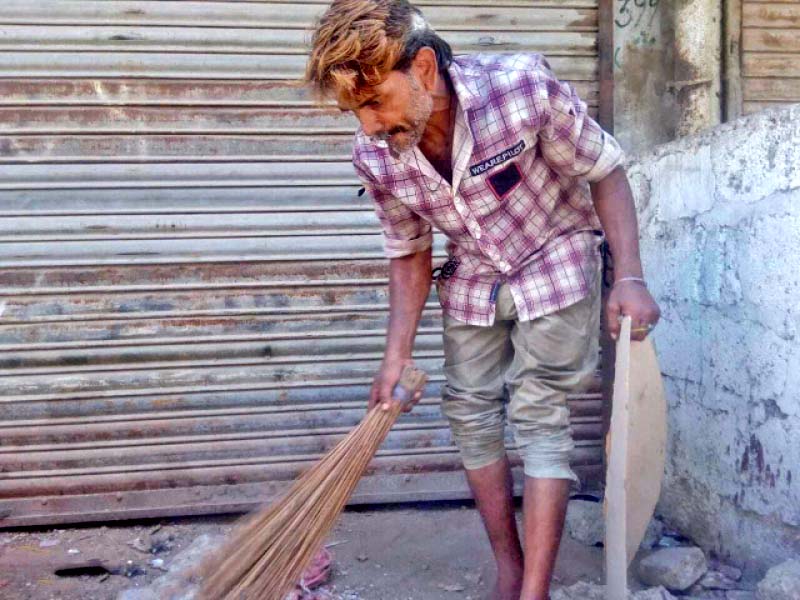
According to Robin Masih, a sanitary worker from Christian Colony, the majority of the cleaners employed by the city’s various public institutions are elderly individuals who belong to minority communities and dwell in slums across Keamari, Mauripur, Lyari, Essa Nagri, Musharraf Colony and other areas.
“Most of us have been associated with the profession for decades and are now nearing the age of retirement but our younger generation isn’t willing to follow suit,” said Masih. “We rise with the sun and start our shifts at dawn by sweeping the city’s thoroughfares. Although we are meant to work eight hours every day, shifts can often extend between 12 to 16 and at times 24 hours in times of crisis. We don’t get any offs besides religious holidays and are paid meagre salaries which makes surviving very difficult in this economy, let alone any chances of improving our living conditions,” he added.
The bustling metropolis of Karachi, says Masih, is based on six districts and divided into 18 towns in accordance with the former local body system. The District Municipal Corporation (DMC) and the Karachi Municipal Corporation (KMC) are the two main departments responsible for cleaning the city and for this, they employ two types of sanitary workers-- the garbage pickers and sewer divers.
“It’s hard to tell what a privately employed cleaner may be paid but those working on contracts are paid between Rs15,000 to Rs20,000, which is still not much,” he explained. “So given the meagre salary and the backbreaking labour involved this line of work, many among our young generation do not wish to follow after us. Instead, they aspire to get an education and find work in a profession which improves their chances of social mobility.”
As per Syed Tanveer Kazmi, who is in charge of a cleaning company which renders its service to local union committees, the ban on the son’s quota in public institutions is also a major reason behind the younger generation of sanitary workers breaking away from their parents’ line of work.
“It’s mostly people from Hindu and Christian communities who have dominated this field of work for the longest time,” said Kazmi. “But since most of the workers are on the brink of retirement and there’s no one to take after them anymore, hence private companies with the permission of local bodies are now employing Afghan workers to fill in, especially as garbage pickers.”
However, when it comes to sewer diving, Kazmi shares, the job is still held by a majority of veteran workers from religious minorities.
Addressing the plight of these workers in times of pandemic, Union Council (UC) 36 central vice chairperson Shamshad Zaidi told The Express Tribune that although private cleaning companies have been working under UCs after securing NOCs from the DMCs, no specific training is provided to the people employed as cleaners and sanitary workers.
“Many of the people associated with the profession are usually tasked with sweeping the streets,” he asserted. “However, despite the growing risk of the virus, these professionals, who are still expected to work during the lockdown, have not been provided with any safety equipment or face masks. The dust which constantly enters their respiratory system makes them prone to respiratory diseases and the lack of medical facilities in various institutions increases their risk of succumbing to the disease.”
Published in The Express Tribune, May 30th, 2020.

















COMMENTS
Comments are moderated and generally will be posted if they are on-topic and not abusive.
For more information, please see our Comments FAQ